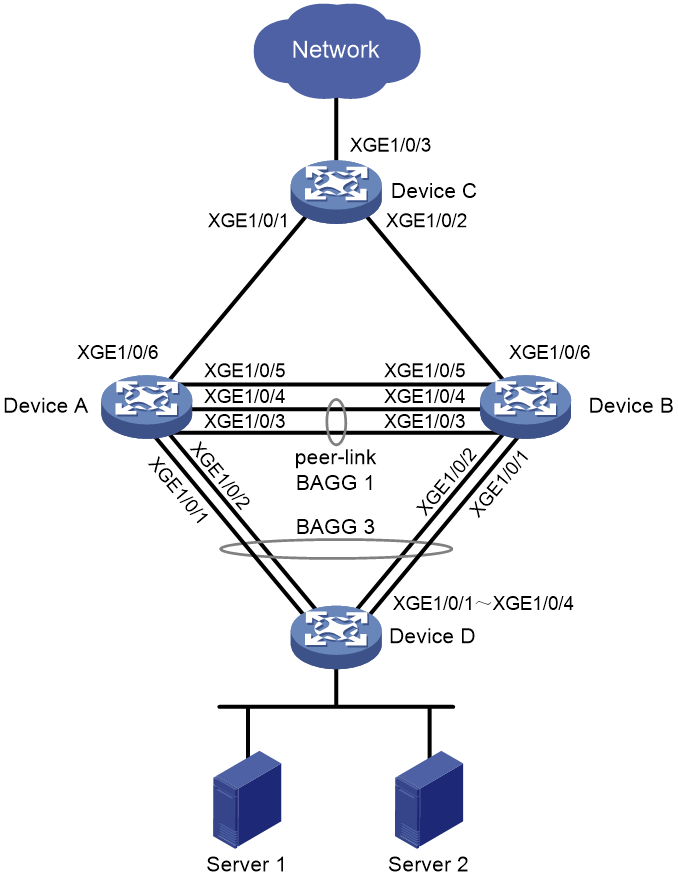两台堆叠或者mlag组网的交换机,上行连接路由器跑ospf
- 1关注
- 0收藏,3302浏览
问题描述:
这种情况下,流量是负载分担的吗,如果出去走左边,回来走右边,这样有影响吗?
- 2024-01-25提问
- 举报
-
(0)

负载分担的,没有影响,上联聚合
1.24.3 M-LAG双活网关场景下通过动态路由接入M-LAG配置举例
1. 组网需求
如图1-19所示,用户在服务器上通过三层路由方式接入到M-LAG时,需要满足以下要求:
· 当一条接入链路发生故障时,流量可以快速切换到另一条链路,保证可靠性。
· 用户流量在两条接入链路上负载分担。
2. 组网图
图1-19 M-LAG双活网关场景下通过动态路由接入M-LAG配置组网图
3. 配置限制和指导
配置前设备的所有参数均采用出厂时的缺省配置。如果您已经对设备进行了配置,为了保证配置效果,请确认现有配置和以下配置不冲突。
同级M-LAG设备的m-lag system-mac应配置为相同,不同级M-LAG设备的m-lag system-mac一定要配置为不同。
M-LAG双活网关组网环境下,M-LAG设备的下行VLAN接口不要配置本地代理ARP/ND功能,否则会触发流量环路。有关ARP/ND本地代理功能的详细介绍,请参见“三层技术-IP业务配置指导”中的“代理ARP”和“IPv6邻居发现”。
4. 配置步骤
# 配置M-LAG系统参数。
<DeviceA> system-view
[DeviceA] m-lag system-mac 2-2-2
[DeviceA] m-lag system-number 1
[DeviceA] m-lag system-priority 123
# 配置Keepalive报文的目的IP地址和源IP地址。
[DeviceA] m-lag keepalive ip destination 21.1.1.2 source 21.1.1.1
# 配置端口Ten-GigabitEthernet1/0/5工作在三层模式,并配置IP地址为Keepalive报文的源IP地址。
[DeviceA] interface ten-gigabitethernet 1/0/5
[DeviceA-Ten-GigabitEthernet1/0/5] port link-mode route
[DeviceA-Ten-GigabitEthernet1/0/5] ip address 21.1.1.1 24
[DeviceA-Ten-GigabitEthernet1/0/5] ipv6 address 21::1 64
[DeviceA-Ten-GigabitEthernet1/0/5] quit
# 配置Keepalive链路接口为M-LAG保留接口。
[DeviceA] m-lag mad exclude interface ten-gigabitethernet 1/0/5
# 创建动态二层聚合接口1。
[DeviceA] interface bridge-aggregation 1
[DeviceA-Bridge-Aggregation1] link-aggregation mode dynamic
[DeviceA-Bridge-Aggregation1] quit
# 分别将端口Ten-GigabitEthernet1/0/3和Ten-GigabitEthernet1/0/4加入到聚合组1中。
[DeviceA] interface ten-gigabitethernet 1/0/3
[DeviceA-Ten-GigabitEthernet1/0/3] port link-aggregation group 1
[DeviceA-Ten-GigabitEthernet1/0/3] quit
[DeviceA] interface ten-gigabitethernet 1/0/4
[DeviceA-Ten-GigabitEthernet1/0/4] port link-aggregation group 1
[DeviceA-Ten-GigabitEthernet1/0/4] quit
# 将二层聚合接口1配置为peer-link接口。
[DeviceA] interface bridge-aggregation 1
[DeviceA-Bridge-Aggregation1] port m-lag peer-link 1
[DeviceA-Bridge-Aggregation1] undo mac-address static source-check enable
[DeviceA-Bridge-Aggregation1] quit
# 创建动态二层聚合接口3,并配置该接口为M-LAG接口1。
[DeviceA] interface bridge-aggregation 3
[DeviceA-Bridge-Aggregation3] link-aggregation mode dynamic
[DeviceA-Bridge-Aggregation3] port m-lag group 1
[DeviceA-Bridge-Aggregation3] quit
# 将端口Ten-GigabitEthernet1/0/1和Ten-GigabitEthernet1/0/2加入到聚合组3中。
[DeviceA] interface ten-gigabitethernet 1/0/1
[DeviceA-Ten-GigabitEthernet1/0/1] port link-aggregation group 3
[DeviceA-Ten-GigabitEthernet1/0/1] quit
[DeviceA] interface ten-gigabitethernet 1/0/2
[DeviceA-Ten-GigabitEthernet1/0/2] port link-aggregation group 3
[DeviceA-Ten-GigabitEthernet1/0/2] quit
# 创建VLAN 102、VLAN 103。
[DeviceA] vlan 102 103
# 配置二层聚合接口3为Trunk端口,并允许VLAN 102和VLAN 103的报文通过。
[DeviceA] interface bridge-aggregation 3
[DeviceA-Bridge-Aggregation3] port link-type trunk
[DeviceA-Bridge-Aggregation3] port trunk permit vlan 102 103
[DeviceA-Bridge-Aggregation3] quit
# 创建接口Vlan-interface102,并配置其IPv4和IPv6地址,作为双活网关。
[DeviceA] interface vlan-interface 102
[DeviceA-Vlan-interface102] ip address 10.102.0.1 255.255.255.0
[DeviceA-Vlan-interface102] ipv6 address 10:102::1 64
# 配置M-LAG虚拟IPv4和IPv6地址,以便和下行设备Device D建立OSPF和OSPFv3邻居关系。
[DeviceA-Vlan-interface102] port m-lag virtual-ip 10.102.0.3 24 active
[DeviceA-Vlan-interface102] port m-lag ipv6 virtual-ip FE80::2 link-local
# 配置接口Vlan-interface102的MAC地址。
[DeviceA-Vlan-interface102] mac-address 3-3-3
[DeviceA-Vlan-interface102] quit
# 配置Vlan-interface102接口为M-LAG保留接口。
[DeviceA] m-lag mad exclude interface vlan-interface 102
# 创建接口Vlan-interface103,并配置其IPv4和IPv6地址,作为双活网关。
[DeviceA] interface vlan-interface 103
[DeviceA-Vlan-interface103] ip address 10.103.0.1 24
[DeviceA-Vlan-interface103] ipv6 address 10:103::1 64
# 配置M-LAG虚拟IPv4和IPv6地址,以便和下行设备Device D建立BGP和BGP4+邻居关系。
[DeviceA-Vlan-interface103] port m-lag virtual-ip 10.103.0.3 24 active
[DeviceA-Vlan-interface103] port m-lag ipv6 virtual-ip 10:103::3 64 active
# 配置接口Vlan-interface103的MAC地址。
[DeviceA-Vlan-interface103] mac-address 4-4-4
[DeviceA-Vlan-interface103] quit
# 配置Vlan-interface103接口为M-LAG保留接口。
[DeviceA] m-lag mad exclude interface vlan-interface 103
# 配置上行口Ten-GigabitEthernet1/0/6的IPv4地址和IPv6地址。
[DeviceA] interface ten-gigabitethernet 1/0/6
[DeviceA-Ten-GigabitEthernet1/0/6] port link-mode route
[DeviceA-Ten-GigabitEthernet1/0/6] ip address 32.1.1.1 24
[DeviceA-Ten-GigabitEthernet1/0/6] ipv6 address 32:1::1 64
[DeviceA-Ten-GigabitEthernet1/0/6] quit
# 配置OSPF。
[DeviceA] ospf 1 router-id 11.1.1.1
[DeviceA-ospf-1] area 0
[DeviceA-ospf-1-area-0.0.0.0] quit
[DeviceA-ospf-1] quit
[DeviceA] interface vlan-interface 102
[DeviceA-Vlan-interface102] ospf 1 area 0
[DeviceA-Vlan-interface102] ospf peer sub-address enable 10.102.0.3
[DeviceA-Vlan-interface102] quit
[DeviceA] interface ten-gigabitethernet 1/0/6
[DeviceA-Ten-GigabitEthernet1/0/6] ospf 1 area 0
[DeviceA-Ten-GigabitEthernet1/0/6] quit
# 配置OSPFv3。
[DeviceA] ospfv3 1
[DeviceA-ospfv3-1] router-id 10.1.1.1
[DeviceA-ospfv3-1] area 0
[DeviceA-ospfv3-1-area-0.0.0.0] quit
[DeviceA-ospfv3-1] quit
[DeviceA] interface vlan-interface 102
[DeviceA-Vlan-interface102] ospfv3 1 area 0
[DeviceA-Vlan-interface102] quit
[DeviceA] interface ten-gigabitethernet 1/0/6
[DeviceA-Ten-GigabitEthernet1/0/6] ospfv3 1 area 0
[DeviceA-Ten-GigabitEthernet1/0/6] quit
# 配置BGP。
[DeviceA] bgp 100
[DeviceA-bgp-default] router-id 12.1.1.1
[DeviceA-bgp-default] peer 32.1.1.2 as-number 100
[DeviceA-bgp-default] peer 10.103.0.2 as-number 100
[DeviceA-bgp-default] peer 10.103.0.2 source-address 10.103.0.3
[DeviceA-bgp-default] address-family ipv4
[DeviceA-bgp-default-ipv4] peer 10.103.0.2 enable
[DeviceA-bgp-default-ipv4] network 10.103.0.0 255.255.255.0
[DeviceA-bgp-default-ipv4] peer 32.1.1.2 enable
[DeviceA-bgp-default-ipv4] network 32.1.1.0 255.255.255.0
[DeviceA-bgp-default-ipv4] quit
# 配置BGP4+。
[DeviceA-bgp-default] peer 32:1::2 as-number 100
[DeviceA-bgp-default] peer 10:103::2 as-number 100
[DeviceA-bgp-default] peer 10:103::2 source-address 10:103::3
[DeviceA-bgp-default] address-family ipv6
[DeviceA-bgp-default-ipv6] peer 10:103::2 enable
[DeviceA-bgp-default-ipv6] network 10:103::2 64
[DeviceA-bgp-default-ipv6] peer 32:1::2 enable
[DeviceA-bgp-default-ipv6] network 32:1::2 64
[DeviceA-bgp-default-ipv6] quit
(2) 配置Device B
# 配置M-LAG系统参数。
<DeviceB> system-view
[DeviceB] m-lag system-mac 2-2-2
[DeviceB] m-lag system-number 2
[DeviceB] m-lag system-priority 123
# 配置Keepalive报文的目的IP地址和源IP地址。
[DeviceB] m-lag keepalive ip destination 21.1.1.1 source 21.1.1.2
# 配置端口Ten-GigabitEthernet1/0/5工作在三层模式,并配置IP地址为Keepalive报文的源IP地址。
[DeviceB] interface ten-gigabitethernet 1/0/5
[DeviceB-Ten-GigabitEthernet1/0/5] port link-mode route
[DeviceB-Ten-GigabitEthernet1/0/5] ip address 21.1.1.2 255.255.255.0
[DeviceB-Ten-GigabitEthernet1/0/5] ipv6 address 21::2 64
[DeviceB-Ten-GigabitEthernet1/0/5] quit
# 配置Keepalive链路接口为保留接口。
[DeviceB] m-lag mad exclude interface ten-gigabitethernet 1/0/5
# 创建动态二层聚合接口1。
[DeviceB] interface bridge-aggregation 1
[DeviceB-Bridge-Aggregation1] link-aggregation mode dynamic
[DeviceB-Bridge-Aggregation1] quit
# 分别将端口Ten-GigabitEthernet1/0/3和Ten-GigabitEthernet1/0/4加入到聚合组1中。
[DeviceB] interface ten-gigabitethernet 1/0/3
[DeviceB-Ten-GigabitEthernet1/0/3] port link-aggregation group 1
[DeviceB-Ten-GigabitEthernet1/0/3] quit
[DeviceB] interface ten-gigabitethernet 1/0/4
[DeviceB-Ten-GigabitEthernet1/0/4] port link-aggregation group 1
[DeviceB-Ten-GigabitEthernet1/0/4] quit
# 将二层聚合接口1配置为peer-link接口。
[DeviceB] interface bridge-aggregation 1
[DeviceB-Bridge-Aggregation1] port m-lag peer-link 1
[DeviceB-Bridge-Aggregation1] undo mac-address static source-check enable
[DeviceB-Bridge-Aggregation1] quit
# 创建动态二层聚合接口3,并配置该接口为M-LAG接口1。
[DeviceB] interface bridge-aggregation 3
[DeviceB-Bridge-Aggregation3] link-aggregation mode dynamic
[DeviceB-Bridge-Aggregation3] port m-lag group 1
[DeviceB-Bridge-Aggregation3] quit
# 将端口Ten-GigabitEthernet1/0/1和Ten-GigabitEthernet1/0/2加入到聚合组3中。
[DeviceB] interface ten-gigabitethernet 1/0/1
[DeviceB-Ten-GigabitEthernet1/0/1] port link-aggregation group 3
[DeviceB-Ten-GigabitEthernet1/0/1] quit
[DeviceB] interface ten-gigabitethernet 1/0/2
[DeviceB-Ten-GigabitEthernet1/0/2] port link-aggregation group 3
[DeviceB-Ten-GigabitEthernet1/0/2] quit
# 创建VLAN 102、103。
[DeviceB] vlan 102 103
# 配置二层聚合接口3为Trunk端口,并允许VLAN 102和VLAN 103的报文通过。
[DeviceB] interface bridge-aggregation 3
[DeviceB-Bridge-Aggregation3] port link-type trunk
[DeviceB-Bridge-Aggregation3] port trunk permit vlan 102 103
[DeviceB-Bridge-Aggregation3] quit
# 创建接口Vlan-interface102,并配置其IPv4和IPv6地址,作为双活网关。
[DeviceB] interface vlan-interface 102
[DeviceB-Vlan-interface102] ip address 10.102.0.1 24
[DeviceB-Vlan-interface102] ipv6 address 10:102::1 64
# 配置M-LAG虚拟IPv4和IPv6地址,以便和下行设备Device D建立OSPF和OSPFv3邻居关系。
[DeviceB-Vlan-interface102] port m-lag virtual-ip 10.102.0.4 24 active
[DeviceB-Vlan-interface102] port m-lag ipv6 virtual-ip FE80::4 link-local
# 配置接口Vlan-interface102的MAC地址。
[DeviceB-Vlan-interface102] mac-address 3-3-3
[DeviceB-Vlan-interface102] quit
# 配置Vlan-interface102接口为M-LAG保留接口。
[DeviceB] m-lag mad exclude interface vlan-interface 102
# 创建接口Vlan-interface103,并配置其IPv4和IPv6地址,作为双活网关。
[DeviceB] interface vlan-interface 103
[DeviceB-Vlan-interface103] ip address 10.103.0.1 24
[DeviceB-Vlan-interface103] ipv6 address 10:103::1 64
# 配置M-LAG虚拟IPv4和IPv6地址,以便和下行设备Device D建立BGP和BGP4+邻居关系。
[DeviceB-Vlan-interface103] port m-lag virtual-ip 10.103.0.4 24 active
[DeviceB-Vlan-interface103] port m-lag ipv6 virtual-ip 10:103::4 64 active
# 配置接口Vlan-interface103的MAC地址。
[DeviceB-Vlan-interface103] mac-address 4-4-4
[DeviceB-Vlan-interface103] quit
# 配置Vlan-interface103接口为M-LAG保留接口。
[DeviceB] m-lag mad exclude interface vlan-interface 103
# 配置上行口Ten-GigabitEthernet1/0/6的IPv4地址和IPv6地址。
[DeviceB] interface ten-gigabitethernet 1/0/6
[DeviceB-Ten-GigabitEthernet1/0/6] port link-mode route
[DeviceB-Ten-GigabitEthernet1/0/6] ip address 33.1.1.1 24
[DeviceB-Ten-GigabitEthernet1/0/6] ipv6 address 33:1::1 64
[DeviceB-Ten-GigabitEthernet1/0/6] quit
# 配置OSPF。
[DeviceB] ospf 1 router-id 11.1.1.2
[DeviceB-ospf-1] area 0
[DeviceB-ospf-1-area-0.0.0.0] quit
[DeviceB-ospf-1] quit
[DeviceB] interface vlan-interface 102
[DeviceB-Vlan-interface102] ospf 1 area 0
[DeviceB-Vlan-interface102] ospf peer sub-address enable 10.102.0.4
[DeviceB-Vlan-interface102] quit
[DeviceB] interface ten-gigabitethernet 1/0/6
[DeviceB-Ten-GigabitEthernet1/0/6] ospf 1 area 0
[DeviceB-Ten-GigabitEthernet1/0/6] quit
# 配置OSPFv3。
[DeviceB] ospfv3 1
[DeviceB-ospfv3-1] router-id 10.1.1.2
[DeviceB-ospfv3-1] area 0
[DeviceB-ospfv3-1-area-0.0.0.0] quit
[DeviceB-ospfv3-1] quit
[DeviceB] interface vlan-interface 102
[DeviceB-Vlan-interface102] ospfv3 1 area 0
[DeviceB-Vlan-interface102] quit
[DeviceB] interface ten-gigabitethernet 1/0/6
[DeviceB-Ten-GigabitEthernet1/0/6] ospfv3 1 area 0
[DeviceB-Ten-GigabitEthernet1/0/6] quit
# 配置BGP。
[DeviceB] bgp 100
[DeviceB-bgp-default] router-id 12.1.1.2
[DeviceB-bgp-default] peer 33.1.1.2 as-number 100
[DeviceB-bgp-default] peer 10.103.0.2 as-number 100
[DeviceB-bgp-default] peer 10.103.0.2 source-address 10.103.0.4
[DeviceB-bgp-default] address-family ipv4
[DeviceB-bgp-default-ipv4] peer 10.103.0.2 enable
[DeviceB-bgp-default-ipv4] network 10.103.0.0 255.255.255.0
[DeviceB-bgp-default-ipv4] peer 33.1.1.2 enable
[DeviceB-bgp-default-ipv4] network 33.1.1.0 255.255.255.0
[DeviceB-bgp-default-ipv4] quit
# 配置BGP4+。
[DeviceB-bgp-default] peer 33:1::2 as-number 100
[DeviceB-bgp-default] peer 10:103::2 as-number 100
[DeviceB-bgp-default] peer 10:103::2 source-address 10:103::4
[DeviceB-bgp-default] address-family ipv6
[DeviceB-bgp-default-ipv6] peer 10:103::2 enable
[DeviceB-bgp-default-ipv6] network 10:103::2 64
[DeviceB-bgp-default-ipv6] peer 33:1::2 enable
[DeviceB-bgp-default-ipv6] network 33:1::2 64
[DeviceB-bgp-default-ipv6] quit
(3) 配置Device C
# 配置接口Ten-GigabitEthernet1/0/1和Ten-GigabitEthernet1/0/2的IPv4地址和IPv6地址。
[DeviceC] interface ten-gigabitethernet 1/0/1
[DeviceC-Ten-GigabitEthernet1/0/1] port link-mode route
[DeviceC-Ten-GigabitEthernet1/0/1] ip address 32.1.1.2 24
[DeviceC-Ten-GigabitEthernet1/0/1] ipv6 address 32:1::2 64
[DeviceC-Ten-GigabitEthernet1/0/1] quit
[DeviceC] interface ten-gigabitethernet 1/0/2
[DeviceC-Ten-GigabitEthernet1/0/2] port link-mode route
[DeviceC-Ten-GigabitEthernet1/0/2] ip address 33.1.1.2 24
[DeviceC-Ten-GigabitEthernet1/0/2] ipv6 address 33:1::2 64
[DeviceC-Ten-GigabitEthernet1/0/2] quit
# 配置OSPF。
[DeviceC] ospf 1 router-id 11.1.1.3
[DeviceC-ospf-1] area 0
[DeviceC-ospf-1-area-0.0.0.0] quit
[DeviceC-ospf-1] quit
[DeviceC] interface ten-gigabitethernet 1/0/1
[DeviceC-Ten-GigabitEthernet1/0/1] ospf 1 area 0
[DeviceC-Ten-GigabitEthernet1/0/1] quit
[DeviceC] interface ten-gigabitethernet 1/0/2
[DeviceC-Ten-GigabitEthernet1/0/2] ospf 1 area 0
[DeviceC-Ten-GigabitEthernet1/0/2] quit
# 配置OSPFv3。
[DeviceC] ospfv3 1
[DeviceC-ospfv3-1] router-id 10.1.1.3
[DeviceC-ospfv3-1] area 0
[DeviceC-ospfv3-1-area-0.0.0.0] quit
[DeviceC-ospfv3-1] quit
[DeviceC] interface ten-gigabitethernet 1/0/1
[DeviceC-Ten-GigabitEthernet1/0/1] ospfv3 1 area 0
[DeviceC-Ten-GigabitEthernet1/0/1] quit
[DeviceC] interface ten-gigabitethernet 1/0/2
[DeviceC-Ten-GigabitEthernet1/0/2] ospfv3 1 area 0
[DeviceC-Ten-GigabitEthernet1/0/2] quit
# 配置BGP。
[DeviceC] bgp 100
[DeviceC-bgp-default] router-id 12.1.1.3
[DeviceC-bgp-default] peer 33.1.1.1 as-number 100
[DeviceC-bgp-default] peer 32.1.1.1 as-number 100
[DeviceC-bgp-default] address-family ipv4
[DeviceC-bgp-default-ipv4] peer 33.1.1.1 enable
[DeviceC-bgp-default-ipv4] network 33.1.1.0 255.255.255.0
[DeviceC-bgp-default-ipv4] peer 32.1.1.1 enable
[DeviceC-bgp-default-ipv4] network 32.1.1.0 255.255.255.0
[DeviceC-bgp-default-ipv4] quit
# 配置BGP4+。
[DeviceC-bgp-default] peer 33:1::1 as-number 100
[DeviceC-bgp-default] peer 32:1::1 as-number 100
[DeviceC-bgp-default] address-family ipv6
[DeviceC-bgp-default-ipv6] peer 32:1::1 enable
[DeviceC-bgp-default-ipv6] peer 33:1::1 enable
[DeviceC-bgp-default-ipv6] network 32:1:: 64
[DeviceC-bgp-default-ipv6] network 33:1:: 64
[DeviceC-bgp-default-ipv6] quit
[DeviceC-bgp-default] quit
(4) 配置Device D
# 创建VLAN 102、VLAN 103。
<DeviceD> system-view
[DeviceD] vlan 102 103
# 创建二层聚合接口3,并配置该接口为动态聚合模式。
[DeviceD] interface bridge-aggregation 3
[DeviceD-Bridge-Aggregation3] link-aggregation mode dynamic
[DeviceD-Bridge-Aggregation3] quit
# 将端口Ten-GigabitEthernet1/0/1~Ten-GigabitEthernet1/0/4加入到聚合组3中。
[DeviceD] interface range ten-gigabitethernet 1/0/1 to ten-gigabitethernet 1/0/4
[DeviceD-if-range] port link-aggregation group 3
[DeviceD-if-range] quit
# 配置二层聚合接口3为Trunk端口,并允许VLAN 102和VLAN 103的报文通过。
[DeviceD] interface bridge-aggregation 3
[DeviceD-Bridge-Aggregation3] port link-type trunk
[DeviceD-Bridge-Aggregation3] port trunk permit vlan 102 103
[DeviceD-Bridge-Aggregation3] quit
# 创建接口Vlan-interface102,并配置其IPv4和IPv6地址。
[DeviceD] interface vlan-interface 102
[DeviceD-Vlan-interface102] ip address 10.102.0.2 24
[DeviceD-Vlan-interface102] ipv6 address 10:102::2 64
[DeviceD-Vlan-interface102] quit
# 创建接口Vlan-interface103,并配置其IPv4和IPv6地址。
[DeviceD] interface vlan-interface 103
[DeviceD-Vlan-interface103] ip address 10.103.0.2 24
[DeviceD-Vlan-interface103] ipv6 address 10:103::2 64
[DeviceD-Vlan-interface103] quit
# 配置OSPF。
[DeviceD] ospf 1 router-id 11.1.1.4
[DeviceD-ospf-1] area 0
[DeviceD-ospf-1-area-0.0.0.0] quit
[DeviceD-ospf-1] quit
[DeviceD] interface vlan-interface 102
[DeviceD-Vlan-interface102] ospf 1 area 0
[DeviceD-Vlan-interface102] quit
[DeviceD] interface vlan-interface 103
[DeviceD-Vlan-interface103] ospf 1 area 0
[DeviceD-Vlan-interface103] quit
# 配置OSPFv3。
[DeviceD] ospfv3 1
[DeviceD-ospfv3-1] router-id 10.1.1.4
[DeviceD-ospfv3-1] area 0
[DeviceD-ospfv3-1-area-0.0.0.0] quit
[DeviceD-ospfv3-1] quit
[DeviceD] interface vlan-interface 102
[DeviceD-Vlan-interface102] ospfv3 1 area 0
[DeviceD-Vlan-interface102] quit
[DeviceD] interface vlan-interface 103
[DeviceD-Vlan-interface103] ospfv3 1 area 0
[DeviceD-Vlan-interface103] quit
# 配置BGP。
[DeviceD] bgp 100
[DeviceD-bgp-default] router-id 12.1.1.4
[DeviceD-bgp-default] peer 10.103.0.3 as-number 100
[DeviceD-bgp-default] peer 10.103.0.4 as-number 100
[DeviceD-bgp-default] address-family ipv4
[DeviceD-bgp-default-ipv4] peer 10.103.0.3 enable
[DeviceD-bgp-default-ipv4] peer 10.103.0.4 enable
[DeviceD-bgp-default-ipv4] network 10.103.0.3 255.255.255.0
[DeviceD-bgp-default-ipv4] quit
# 配置BGP4+。
[DeviceD-bgp-default] peer 10:103::3 as-number 100
[DeviceD-bgp-default] peer 10:103::4 as-number 100
[DeviceD-bgp-default] address-family ipv6
[DeviceD-bgp-default-ipv6] peer 10:103::3 enable
[DeviceD-bgp-default-ipv6] peer 10:103::4 enable
[DeviceD-bgp-default-ipv6] network 10:103::3 64
[DeviceD-bgp-default-ipv6] quit
[DeviceD-bgp-default] quit
5. 验证配置
# 查看M-LAG的简要信息和详细信息,可以看到M-LAG系统正常工作,以Device A为例。
[DeviceA] display m-lag summary
Flags: A -- Aggregate interface down, B -- No peer M-LAG interface configured
C -- Configuration consistency check failed
Peer-link interface: BAGG1
Peer-link interface state (cause): UP
Keepalive link state (cause): UP
M-LAG interface information
M-LAG IF M-LAG group Local state (cause) Peer state Remaining down time(s)
BAGG3 1 UP UP -
[DeviceA] display m-lag verbose
Flags: A -- Home_Gateway, B -- Neighbor_Gateway, C -- Other_Gateway,
D -- PeerLink_Activity, E -- DRCP_Timeout, F -- Gateway_Sync,
G -- Port_Sync, H -- Expired
Peer-link interface/Peer-link interface ID: BAGG1/1
State: UP
Cause: -
Local DRCP flags/Peer DRCP flags: ABDFG/ABDFG
Local Selected ports (index): XGE1/0/3 (260), XGE1/0/4 (261)
Peer Selected ports indexes: 260, 261
M-LAG interface/M-LAG group ID: BAGG3/1
Local M-LAG interface state: UP
Peer M-LAG interface state: UP
M-LAG group state: UP
Local M-LAG interface down cause: -
Remaining M-LAG DOWN time: -
Local M-LAG interface LACP MAC: COnfig=N/A, Effective=0002-0002-0002
Peer M-LAG interface LACP MAC: COnfig=N/A, Effective=0002-0002-0002
Local M-LAG interface LACP priority: COnfig=32768, Effective=123
Peer M-LAG interface LACP priority: COnfig=32768, Effective=123
Local DRCP flags/Peer DRCP flags: ABDFG/ABDFG
Local Selected ports (index): XGE1/0/1 (258), XGE1/0/2 (259)
Peer Selected ports indexes: 258, 259
# 查看设备上的OSPF邻居信息,可以看到OSPF中各邻居的信息,以Device A为例。
[DeviceA] display ospf peer
OSPF Process 1 with Router ID 11.1.1.1
Neighbor Brief Information
Area: 0.0.0.0
Router ID Address Pri Dead-Time State Interface
11.1.1.3 32.1.1.2 1 39 Full/BDR XGE1/0/6
11.1.1.4 10.102.0.2 1 31 Full/DROther Vlan102
11.1.1.2 10.102.0.4 1 37 Full/DR Vlan102
# 查看设备上的OSPFv3邻居信息,可以看到OSPFv3中各邻居的信息,以Device A为例。
[DeviceA] display ospfv3 peer
OSPFv3 Process 1 with Router ID 10.1.1.1
Area: 0.0.0.0
-------------------------------------------------------------------------
Router ID Pri State Dead-Time InstID Interface
10.1.1.3 1 Full/BDR 00:00:34 0 XGE1/0/6
10.1.1.2 1 Full/BDR 00:00:32 0 Vlan102
10.1.1.4 1 Full/DROther 00:00:39 0 Vlan102
# 查看设备上的BGP邻居信息,可以看到BGP中各邻居的信息,以Device A为例。
[DeviceA] display bgp peer ipv4
BGP local router ID: 12.1.1.1
Local AS number: 100
Total number of peers: 2 Peers in established state: 2
* - Dynamically created peer
^ - Peer created through link-local address
Peer AS MsgRcvd MsgSent OutQ PrefRcv Up/Down State
10.103.0.2 100 6 6 0 1 00:01:50 Established
32.1.1.2 100 5 5 0 2 00:00:01 Established
# 查看设备上的BGP4+邻居信息,可以看到BGP4+中各邻居的信息,以Device A为例。
[DeviceA] display bgp peer ipv6
BGP local router ID: 12.1.1.1
Local AS number: 100
Total number of peers: 2 Peers in established state: 2
* - Dynamically created peer
^ - Peer created through link-local address
Peer AS MsgRcvd MsgSent OutQ PrefRcv Up/Down State
10:103::2 100 9 9 0 1 00:04:26 Established
32:1::2 100 6 6 0 2 00:02:13 Established
- 2024-01-25回答
- 评论(0)
- 举报
-
(0)
编辑答案


亲~登录后才可以操作哦!
确定你的邮箱还未认证,请认证邮箱或绑定手机后进行当前操作
举报
×
侵犯我的权益
×
侵犯了我企业的权益
×
- 1. 您举报的内容是什么?(请在邮件中列出您举报的内容和链接地址)
- 2. 您是谁?(身份证明材料,可以是身份证或护照等证件)
- 3. 是哪家企业?(营业执照,单位登记证明等证件)
- 4. 您与该企业的关系是?(您是企业法人或被授权人,需提供企业委托授权书)
抄袭了我的内容
×
原文链接或出处
诽谤我
×
- 1. 您举报的内容以及侵犯了您什么权益?(请在邮件中列出您举报的内容、链接地址,并给出简短的说明)
- 2. 您是谁?(身份证明材料,可以是身份证或护照等证件)
对根叔社区有害的内容
×
不规范转载
×
举报说明


暂无评论